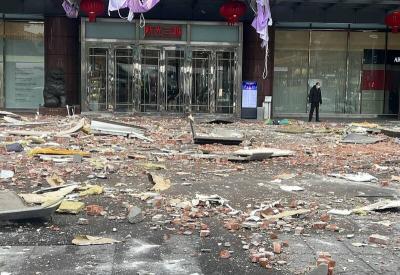The Japanese economy faces three years of deflation as it claws back from its worst slump in decades, the central bank warned yesterday, even as it moved to end some of its recession-busting measures.
The Bank of Japan (BOJ) painted a slightly more optimistic picture of the outlook for economic growth in a twice-yearly report, but warned that prices would keep falling until at least the year to March 2012.
“Japan’s economy has started to pick up, and in the second half of fiscal 2009 it is likely to improve gradually on the back of improvements in overseas economies as well as the effects of economic policy measures,” it said.
But the pace of recovery is likely to remain “moderate” until late next year because it will take time for the global economy to rebound and the effect of pump-priming stimulus measures will wane, it added.
The world’s second-largest economy is set to shrink 3.2 percent in the current financial year to March before rebounding by 1.2 percent next fiscal year and 2.1 percent the following year, the Bank of Japan predicted.
Consumer prices are expected to fall 1.5 percent in the current financial year, followed by a further decline of 0.8 percent next fiscal year and 0.4 percent the following year, the BOJ said.
The BOJ said it was a “critical issue” whether the decline in prices results in a deflationary spiral that depresses economic activity.
But with the pace of deflation expected to gradually slow, that appears unlikely to happen, it added.
Earlier in the day the central bank announced that it would end some of its emergency measures to fight the financial crisis at the end of the year as Asia’s biggest economy emerges from a deep recession.
The BOJ has been tackling the credit crunch with super-low lending rates and other steps to support struggling companies, such as purchases of corporate debt, which will finish at the end of December.
Core consumer prices have now fallen year-on-year for the past seven months, although the pace of decline eased to 2.3 percent last month, after a record 2.4 percent slump in August, the government reported yesterday.
Meanwhile, the unemployment rate fell to 5.3 percent last month, the government reported yesterday, beating market expectations for an increase to 5.6 percent.
A separate survey released by the labor ministry yesterday showed there were 43 job offers for every 100 jobseekers last month, slightly up from a record low of 42 in the previous two months.
It is the first time since May 2007 that the job-offer ratio has improved from the previous month.
Household spending also gained 1 percent last month from a year earlier, increasing for a second consecutive month.

UPDATED (3:40pm): A suspected gas explosion at a shopping mall in Taichung this morning has killed four people and injured 20 others, as emergency responders continue to investigate. The explosion occurred on the 12th floor of the Shin Kong Mitsukoshi in Situn District (西屯) at 11:33am. One person was declared dead at the scene, while three people were declared deceased later after receiving emergency treatment. Another 20 people sustained major or minor injuries. The Taichung Fire Bureau said it received a report of the explosion at 11:33am and sent rescuers to respond. The cause of the explosion is still under investigation, it said. The National Fire

ACCOUNTABILITY: The incident, which occured at a Shin Kong Mitsukoshi Department Store in Taichung, was allegedly caused by a gas explosion on the 12th floor Shin Kong Group (新光集團) president Richard Wu (吳昕陽) yesterday said the company would take responsibility for an apparent gas explosion that resulted in four deaths and 26 injuries at Shin Kong Mitsukoshi Zhonggang Store in Taichung yesterday. The Taichung Fire Bureau at 11:33am yesterday received a report saying that people were injured after an explosion at the department store on Section 3 of Taiwan Boulevard in Taichung’s Situn District (西屯). It sent 56 ambulances and 136 paramedics to the site, with the people injured sent to Cheng Ching Hospital’s Chung Kang Branch, Wuri Lin Shin Hospital, Taichung Veterans General Hospital or Chung

‘TAIWAN-FRIENDLY’: The last time the Web site fact sheet removed the lines on the US not supporting Taiwanese independence was during the Biden administration in 2022 The US Department of State has removed a statement on its Web site that it does not support Taiwanese independence, among changes that the Taiwanese government praised yesterday as supporting Taiwan. The Taiwan-US relations fact sheet, produced by the department’s Bureau of East Asian and Pacific Affairs, previously stated that the US opposes “any unilateral changes to the status quo from either side; we do not support Taiwan independence; and we expect cross-strait differences to be resolved by peaceful means.” In the updated version published on Thursday, the line stating that the US does not support Taiwanese independence had been removed. The updated

‘LAWFUL USE’: The last time a US warship transited the Taiwan Strait was on Oct. 20 last year, and this week’s transit is the first of US President Donald Trump’s second term Two US military vessels transited the Taiwan Strait from Sunday through early yesterday, the Ministry of National Defense said in a statement, the first such mission since US President Donald Trump took office last month. The two vessels sailed south through the Strait, the ministry said, adding that it closely monitored nearby airspace and waters at the time and observed nothing unusual. The ministry did not name the two vessels, but the US Navy identified them as the Arleigh Burke-class guided-missile destroyer USS Ralph Johnson and the Pathfinder-class survey ship USNS Bowditch. The ships carried out a north-to-south transit from